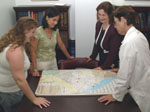Network expands Hollings' clinical
trials
The Hollings Cancer Center has established a Research Network to expand
the center’s clinical trials program. This unique program establishes
the infrastructure for bridging access to cancer clinical trials across
the state and enables sites to share resources and work together in
delivering quality clinical trials. The first partners to join the network are The Regional Medical Center of Orangeburg and Calhoun counties and South Carolina Oncology Associates in Columbia.
 Two centers, one in
Orangeburg and one in Columbia, have joined the new Hollings Cancer
Center Research Network. Eventually the network will include numerous
centers across South Carolina, greatly increasing opportunities for
South Carolinians to participate in potentially lifesaving clinical
trials. At the HCC Clinical Trials Office, from left are Terri Matson,
manager of clinical operations; Tricia Adrales Bentz, research network
coordinator; and Cheryl Sampson, manager of administrative operation.
At right is Dr. Carolyn Reed, clinical director of outreach for HCC.
Two centers, one in
Orangeburg and one in Columbia, have joined the new Hollings Cancer
Center Research Network. Eventually the network will include numerous
centers across South Carolina, greatly increasing opportunities for
South Carolinians to participate in potentially lifesaving clinical
trials. At the HCC Clinical Trials Office, from left are Terri Matson,
manager of clinical operations; Tricia Adrales Bentz, research network
coordinator; and Cheryl Sampson, manager of administrative operation.
At right is Dr. Carolyn Reed, clinical director of outreach for HCC.“This is a win-win situation for the participating centers, the Hollings Cancer Center and ultimately everyone in South Carolina,” said Carolyn Reed, M.D., clinical director of outreach at the MUSC Hollings Cancer Center.
A recent panel report to the National Cancer Institute indicated that there are a lot of discoveries in the area of cancer therapy that unfortunately are not reaching the patients who can benefit from them. About 20 percent of cancer patients in the United States are medically eligible for clinical trials, but only 3 percent actually enroll in these potentially beneficial programs, said Reed. The primary reason is that clinical trials for the most part are conducted through academic medical centers, while 80 percent of cancer patients are treated by community oncologists. In South Carolina, the Research Network can play a crucial role in breaking down this access barrier by fostering partnerships between community medical centers and the academic medical center in Charleston.
The partnerships will provide cancer patients in South Carolina access to new and innovative cancer treatments that are not yet available to the general public. Patients will be able to access treatment in their own community, seeing their own doctors, remaining close to their families and avoiding transportation problems and other inconveniences associated with having to come to Charleston for treatment under a clinical trial protocol.
Doctors at the participating centers will have the opportunity to participate in innovative clinical trials developed by Hollings Cancer Center physicians. The larger centers already have access to national clinical trials, but the smaller centers will be able to pursue an affiliate membership through the Hollings Cancer Center in National Cancer Institute cooperative groups such as the Southwest Oncology Group and the National Surgical and Adjuvant Breast and Bowel Project. This affiliation not only provides access to member-only trials, but also to opportunities for scientific enrichment and academic collaborations with cancer specialists from across the country.
Doctors and other health care professionals in the partner centers will have the opportunity to participate in a variety of seminars, conferences, and Internet-based education programs through affiliation with the Hollings Cancer Center.
For the smaller centers that don’t already have established research programs, the Research Network also provides the doctors and study coordinators guidance and support to promote a successful clinical trials program.
The network will help the Hollings Cancer Center expand its clinical trial program by providing a larger patient base. As more and more centers across the state join the network, the number of patients available for participation in clinical trials increases. “When we seek support for conducting clinical trials, we need to show we have a sufficient numbers of participants,” said Reed. “Our network of partners will greatly expand our potential participant base and enhance South Carolina’s ability to attract additional resources and opportunities to promote cancer research.”
For the past few years, the Hollings Cancer Center has been positioning itself to achieve the status of an NCI-designated cancer center. Many of the requirements for this elite designation are already in place and the clinical trials network with its emphasis on community based collaboration will strengthen the center’s case for NCI designation.
“We are very pleased to be able to provide South Carolina with this network,” said Reed. “The establishment of the network is the result of intensive planning and very hard work on the part of the Hollings Cancer Center’s Clinical Trials Office.” Andrew S. Kraft, M.D., director of the Hollings Cancer Center and Rhonda Yusuff, Ph.D., former director of the Clinical Trials Office, provided oversight for the establishment and vision of the network.
Significant contributions were also made by Terri Matson, manager of clinical operations; Cheryl Sampson, manager of administrative operation; and Tricia Adrales Bentz, research network coordinator. The Clinical Trials Office drove the progress in establishing operational systems and coordinating the logistics of this collaborative infrastructure.
For information on the clinical trial, call Bentz at the Clinical Trials Office at 792-1753.
Friday, July 1, 2005
Catalyst Online is published weekly,
updated
as needed and improved from time to time by the MUSC Office of Public
Relations
for the faculty, employees and students of the Medical University of
South
Carolina. Catalyst Online editor, Kim Draughn, can be reached at
792-4107
or by email, catalyst@musc.edu. Editorial copy can be submitted to
Catalyst
Online and to The Catalyst in print by fax, 792-6723, or by email to
petersnd@musc.edu
or catalyst@musc.edu. To place an ad in The Catalyst hardcopy, call
Community
Press at 849-1778.